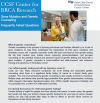
Click here for a downloadable PDF of Gene Mutation and Genetic Counseling FAQ.
Genetic counseling is the process of advising individuals and families affected by or at risk of gene mutations to help them understand the implications of their gene mutations and hereditary cancer risk. A genetic counselor works with each individual on how genetic testing fits into their medical care, makes cancer screening recommendations, and provides counseling on the potential medical and personal impact of genetic testing and living with a gene mutation. A genetic counselor is board-certified and state-licensed, with extensive training and experience in hereditary cancer.
Can I afford genetic testing and will my insurance cover it?
Costs can vary. Many insurance companies will cover testing and associated genetic counseling when there is a significant family history of cancer or a known family gene mutation. The cost of accompanying genetic counseling is also usually covered by insurance. Multiple state and federal laws provide legal protection from genetic discrimination, including GINA (Genetic Information Nondiscrimination Act), HIPAA (Health Insurance Portability and Accountability Act), and the ACA (Affordable Care Act).
I've already had cancer. Do I still need genetic testing?
Genetic testing is helpful for people who have already had cancer. In some cases, the genetic test results can help your doctors choose specific treatments for your type of cancer. Genetic testing can also help people take steps to take to detect or prevent future cancers for themselves or their family members.
How do I find out if I have a gene mutation?
Gene mutations can be determined by a simple saliva or blood test. Our genetic counselors and clinicians can provide information about genetic testing, evaluate your personal and family medical history, and share cancer screening recommendations based on your gene mutation and medical history. Your chance of having a gene mutation depends on many things, including if there is a gene mutation in your family and how you are related to the family member with the gene mutation, your personal medical history, and family history of cancer.
What genetic testing result can I get?
Genetic testing can lead to a wide range of sometimes-complex results. When you are testing for a gene mutation that has already been found in a family member, the results are easier to interpret. “Testing positive” means that you have the same gene mutation as your family member and have an increased chance of developing certain types of cancer. “Testing negative” means that you do not have the gene mutation found in your family member, and your chances of developing cancer are similar to the average person.
What if I test positive for a gene mutation?
A positive genetic test result means that you have an increased chance of developing certain types of cancer. Our clinicians will evaluate your risks based upon your genetic testing results, family history, and other specific risk factors and discuss your goals of care to recommend appropriate options and care plan for you, like cancer screening tests, medications to reduce cancer risk, risk-reducing surgery, and lifestyle changes.
What if I don't want to do genetic testing right now?
If, after genetic counseling, you decide that it is not the right time for you to have genetic testing, the counselor can still discuss cancer screening and prevention. If you are closely related to the family member with a gene mutation, the counselor will usually recommend following guidelines for increased cancer screening, as if positive. However, genetic testing is recommended before considering medications or surgery to prevent cancer.
Can at-home genetic testing kits like 23andMe detect my cancer risk?
The scope of this particular direct- to-consumer-test is limited, and a negative test result does not mean cancer risk is absent. The UCSF Center for BRCA Research and the UCSF Cancer Genetics and Prevention Program support easier access to genetic testing. We have multiple studies underway that bring genetic testing to high-risk families and the general population. Click here to learn more about recent changes to the testing offered by 23andMe.
